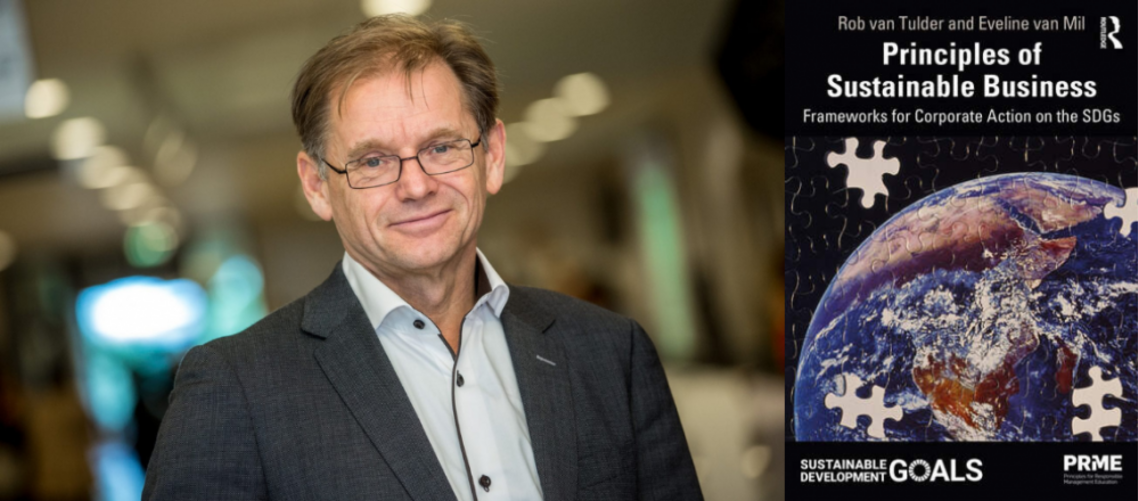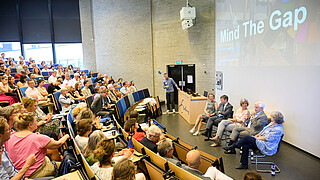High time for action
Introducing his new book during the recent RSM Leadership Summit at the Van Nelle Fabriek in Rotterdam, Prof. Van Tulder described what’s needed before the critical deadline of 2030 set by the UN for meeting the 17 Sustainable Development Goals (SDGs). Realising the SDGs provides an annual $12 trillion investment and growth opportunity, while creating hundreds of millions of jobs in the process. But progress is too slow – as evidenced by society’s inability to deal with pressing human, ecological, economic and health crises – whilst the vast potential for societal value creation remains underutilised. At the Leadership Summit, Van Tulder said Covid-19 had wiped out four years of effort towards addressing global problems so it’s high time for action, but management decisions about making systemic changes can be overwhelming, with alarming acronyms like ‘TINA’ (‘There Is No Alternative’).
Pick an SDG and use the tools
His advice is to pick a pragmatic SDG that the company can influence or facilitate to create resilience against fragile societies and companies. His set of practical tools and checklists for driving sustainability are in the new book. They show how companies can design and implement SDG-relevant strategies at three levels:
-
the macro level – to assess whether the SDGs present ‘wicked problems’ or opportunities
-
the micro level – to develop and operationalise innovative business models, design new business cases and navigate organisational transition trajectories
-
the meso level – to develop fit-for-purpose cross-sector partnering strategies.
These innovative tools are embedded in a coherent sequence of analytical frameworks that can be applied in courses for students, be put into practice by business professionals and used by action researchers to help companies contribute to the UN’s Decade of Action.
Glowing recommendations
-
“The SDGs provide a moral framework at the time the world needs it most. It is also the world’s best long-term business plan. It’s the unlock to what is the growth story of our century, putting people and the planet first. But the implementation is in need of a ‘booster shot’. Principles of Sustainable Business presents state-of-the-art science-based answers on how to achieve this ambition in the Decade of Action. The detailed elaborations of business models, transition trajectories and partnering strategies provide actionable targets for companies that want to drive systems change.” - Paul Polman, Former CEO Unilever, Co-chair and founder IMAGINE, Vice Chair UN Global Compact.
-
“The Decade of Action needs serious acceleration. The intentions are still there, but the realization requires sophisticated approaches of governments, civil society and companies alike. The frameworks offered by this all-encompassing book provide the badly needed road map for the coming years. A truly amazing achievement!” - Prof. Jan Peter Balkenende, former Prime Minister of the Netherlands, chair Dutch Sustainable Growth Coalition.
-
“Principles of Sustainable Business by Rob van Tulder and Eveline van Mil describes in depth why and how businesses should and can be purposeful by creating economic, societal and ecological value at the same time. The authors recognise the importance of how frontrunner companies in the past have been able to break through a number of the critical tipping points to uplift sustainability and contribute to systems change. Sustainability should be anchored in the core of the business and the SDGs could provide a very relevant framework for companies to define where to contribute. The frameworks developed in this book make it possible for (aspiring) leaders to ‘walk the talk’.” - Feike Sijbesma, former CEO DSM, Chair Supervisory Board Philips, member Supervisory Board Unilever.


